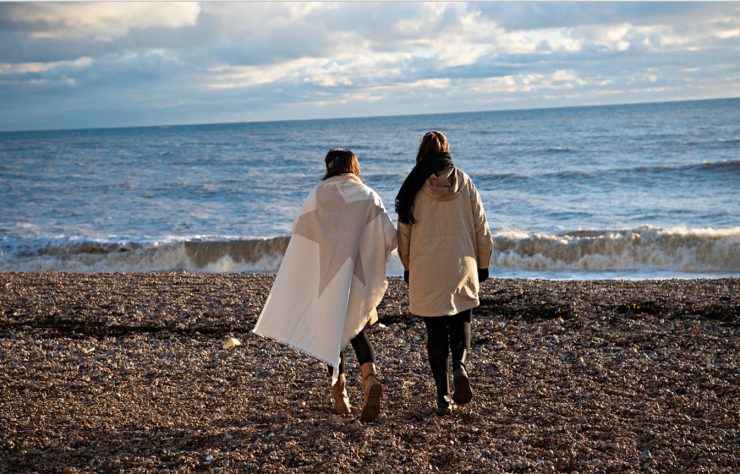Hear from current student Lucille about the types of topics you’ll cover and the skills you’ll learn on the Contemporary History degree at the University of Brighton.
Hi Lucille…
How did you find your course and decide on Brighton?
“The University of Brighton held multiple open days online during COVID times. These organized events helped me decide on what courses would best suit me and discussed in lengthy detail about what the courses entailed. Such events gave me a better insight and outlook into the course from both the lecturers perspective and current students.
“The Contemporary History BA(Hons) degree, really stood out to me because of the ‘contemporary’ part of the degree. Such a degree differs from all other types of history and humanities degrees because it offers you the chance to learn how to challenge and question traditional approaches in history. The skills developed in this degree help you to understand how and why things function the way they do in contemporary society today. Lectures are structured in ways that demonstrate how to dismantle narratives, hegemonic society standards and tackle global issues in a well-balanced manner. These skills are very transferable for anything later in life. Also, the degree gives you the background knowledge to openly critique today’s structures, news and policies.”
Tell us about your passions and interests?
“My passions are history, literature, poetry and reading novels. With that said, I chose to study contemporary history at the university of Brighton because this degree option perfectly combines and incorporates all that I’m interested in. I knew I was always interested in anything within the humanities sector and all things social science related. From there, I began searching through UCAS for different types of history degrees out there, to try and find one I could potentially be interested in.”
Tell us about your favourite aspects of the contemporary history degree?
“My favourite modules have been ‘Race and resistance’, secondly, ‘Culture and Conflict’. In both the pathway options, I’ve learnt about marginalised histories, stories and historical experiences. A few examples are; historical events like 9/11 and the War on Terror, questioning the narratives and ideologies produced after 9/11 and what it meant for global politics; 1994 Rwandan Genocide, Nigeria’s fight for independence, the stories from the Windrush generation, British Black Panther Party (BBP) and the Civil Rights Movement in America.
Furthermore, we delve into different types of theories surroundings topics such as feminism, race, and sexuality. The degree takes an interdisciplinary approach, whereby the lectures, modules and seminar readings are relating to more than one branch of knowledge. Hence, all that we learn interplays perfectly with everything whether that is philosophy, history, literature or globalisation. In first year, all humanities students were put together doing all the same modules – philosophy, history, politics of representation, democracy, cultural studies, and globalisation. Having shared groups, lecturers and modules helped lay the base work for everything and gave me the opportunity to mingle with different students with different interests and strengths.
“Such an approach to learning has helped me improve my essay writing skills and presenting skills, whereby I am able to draw upon different theorists and sources to help deliver a well-balanced argument and presentation.
“Every semester, students get to pick a particular topic of interest, within the set module topics, to present on during the seminar. I’ve presented on the construction of News – discussing about media narratives, the role of black women in America’s civil rights movement, intersectionality in feminism/ women’s liberation movements and the role of conservatism in Grenfell Tower. Additionally, this degree offers amazing small seminar groups after all lectures. This has allowed me to engage in conversations with fellow uni students and enrichen my interpersonal skills. The small seminar groups give everyone fair chance and equal space to share valuable opinions and takes on the different topics. Also, the seminar groups have helped me develop my ability to make persuasive arguments by participating in debates and discussions and improve on conversational skills.”
What skills have you learnt?
“The skills I have learnt include, critical understanding, analysing, presenting, public speaking and well developed writing skills. I personally like the fact that in this degree I have been shown different principles; such as politics, philosophy, cultural studies, democracy and globalisation. The readings list allow us to critically engage with a wide range of different cultural texts such as ‘Routledge History of Social protest in Popular Music by Jonathan C . Friedman’ (discussing about the power and influence of African- American Soul and R&B music in terms of resistance and civil rights), and speeches such as Enoch Powell Rivers of Blood speech, how this relates to British nationalism and immigration.”
How have you found uni life – was it what you expected?
“The best part of my university experience is all the additional clubs and opportunities it offers, that I can take part in along side my degree. There are clubs that are closely related to my history degree or others that deviate far from it. During second semester of first year, I joined a new programme scheme called Inclusive Practice Partner (IPP). This job focuses on decolonising academia and university material, finding ways to make university academia more inclusive, diverse and overall well rounded for all students. In this job, I learnt how to analyse material, write proposals for different modules across the university.
“A few modules I have critiqued and wrote proposals for include; Critical addictions module for Criminology degree, Creative writing module for English Language and Creative Writing students. I’ve been able to harness my creative skills and research skills further. Similarly, this job has given me the amazing opportunity to work alongside fellow students and IPPs to create proposals and campaigns for different interests, gaining teamwork skills.”
Find out about studying Contemporary History BA(Hons).


Published by